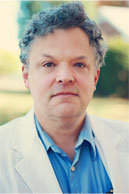Nicholas Watters, PsyD
Clinical Psychologist


Psychiatric diagnosis is made clinically, that is by observation by a mental health professional and a review of signs and symptoms.
Before a psychiatric diagnosis can be made, an exam must be done to rule out medical conditions. It is important to report all of your symptoms to all of your doctors.
I have been working in Hardin County since 2005. The bulk of my work was in Individual and Family Therapy, psychological assessments and other reports. Helping the patient find the meaning in his or her life is the starting point; then steps to make and sustain lifestyle changes and develop long-term goals can be accomplished.
I am a transplant from Chicago, where I had most of my education and training. I have been living and working in Hardin County since 2005 (originally as part of the National Health Service Corps). I provide Individual and Family Psychotherapy, and conduct psychological and neuropsychological assessments. I work with adults and adolescents. (Referrals for younger children are available by request).
My specialized education and training are in neuropsychological assessment and therapeutic interventions to improve functioning in people with complex medical and neurological disorders. In addition to the practice here, I am working together with rehabilitation providers in the area. Our goal is to build up resources in the area so that families who are dealing with acquired brain injury can be served in the community.
What to expect
It isn’t advice. We do provide a fresh and knowledgeable perspective, and sometimes we come up with new ideas. However, most people are already very well aware of what they should be doing – putting it into practice is another story. For example, some people who are going through Major Depressive Disorder have a gut feeling that they are making the wrong decision, no matter what decision they make. This makes life very difficult.
We humans have a head (prefrontal cortex) and a heart (the limbic system). We need to listen to both, but sometimes they are in a conflict that cannot be resolved without help. For example, in Posttraumatic Stress Disorder, the head knows that the danger is over, but the heart is primed for an emergency and will not let the body return to a calm state.
If you have tried to break or change a habit, you know that willpower is only part of the story. Your habits come partly from biology (craving sweets is an example) but they are also influenced by the people, places and realities in your life. That is why a plan to make changes has to fit you as an individual.
How does it work? The state of the art is Cognitive-Behavioral Therapy (CBT). Cognitive interventions sharpen and change patterns of thinking; behavioral interventions can be used to change habits and even your body’s physiological responses. It is the therapist’s job to help sort out the complex variables in life and develop an action plan make the needed changes in thinking, behavior and reacting.
I can be reached by phone at 270-401-4107 or fax 270-209-0872.